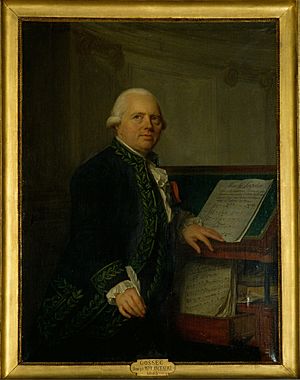François-Joseph Gossec facts for kids
Quick facts for kids
François-Joseph Gossec
|
|
|---|---|

François-Joseph Gossec, by Antoine Vestier
|
|
| Born | 17 January 1734 Vergnies, France
|
| Died | 16 February 1829 (aged 95) Passy, France
|
| Era | Classical |
François-Joseph Gossec (born January 17, 1734 – died February 16, 1829) was a French composer. He wrote many different kinds of music, including operas, string quartets, symphonies, and pieces for choirs.
Life and Music
François-Joseph Gossec was born in a small village called Vergnies. This village was part of France but was surrounded by the Austrian Netherlands. His father was a farmer. From a young age, Gossec showed a strong interest in music. He became a choir-boy in Antwerp, which is now in Belgium.
In 1751, Gossec moved to Paris, France. There, he met a famous composer named Jean-Philippe Rameau. Gossec later became the conductor for a rich music lover named Le Riche de La Poupelinière. This wealthy man had his own private orchestra. Gossec soon decided he wanted to help bring instrumental music back to life in France.
His first symphony was played in 1754. As the conductor for the Prince of Condé's orchestra, he wrote many operas and other musical pieces. He became very important in French music. In 1760, his long piece called Requiem was performed. It was about 90 minutes long and made him famous right away. Years later, in 1778, Wolfgang Amadeus Mozart met Gossec in Paris. Mozart described him as "a very good friend."
Gossec helped start new music groups. In 1769, he created the Concert des Amateurs. In 1773, he helped restart the Concert Spirituel. In these concerts, he conducted his own symphonies. He also played music by other composers, especially Joseph Haydn. Haydn's music became very popular in Paris.
In the 1780s, Gossec wrote fewer symphonies. He started focusing more on operas. In 1784, he helped create the École de Chant, a singing school. He also became the conductor for the band of the Garde Nationale during the French Revolution. In 1795, when the Conservatoire de Musique (a famous music school) was created, Gossec became one of its inspectors. He was also honored with the Legion of Honour.
In 1803, Gossec met Napoleon. Napoleon admired Gossec and asked him to work for him, but Gossec said no. After Napoleon's defeat in 1815, the Conservatoire was temporarily closed. Gossec, who was 81 years old, had to retire. He continued to compose until 1817. He wrote his last pieces, including a third Te Deum. The Conservatoire gave him a pension to support him.
Gossec passed away in Passy, a suburb of Paris. His funeral was held at Père Lachaise Cemetery in Paris. Many of his friends and colleagues, including Cherubini, attended. His grave is close to those of other famous composers.
Gossec used some musical ideas that were ahead of his time. For example, he wrote his Te Deum for 1200 singers and 300 wind instruments! He also wrote pieces where different choirs sang from different places, sometimes even hidden behind the stage. He composed several works to celebrate the French Revolution. These include Le Triomphe de la République and L'Offrande à la Liberté.
One of Gossec's pieces, a Gavotte from his opera Rosine, ou L'épouse abandonnée (1786), is still known today. This is because Carl Stalling and Chuck Jones used parts of it in several Warner Bros. cartoons. A famous example is Porky Pig's dance in Porky's Cafe (1942).
Gossec was not very well known outside of France. His many compositions were often overshadowed by more famous composers. However, he inspired many musicians and greatly helped to bring instrumental music back to life.
Works
Gossec wrote many different types of musical works. Here are some of them:
Symphonies
- Sei sinfonie a più strumenti op. 4 (1759)
- Six symphonies à grand orchestre op. 12 (1769)
- Symphonie de chasse (1776)
- Symphonie à 17 parties en fa majeur (1809)
Chamber Music
- Sei sonate a due violini e basso, Op. 1 (around 1753)
- Sei quartetti per flauto e violino o sia per due violini, alto e basso, Op. 14 (1769)
Vocal and Choral Works
- Messe des morts (Requiem) (1760)
- La Nativité, an oratorio (1774)
- Te Deum (1779)
- Te Deum à la Fête de la Fédération (1790)
- Le Chant du 14 juillet (1791)
Operas
- Le tonnelier, a comic opera (1765)
- Les pêcheurs, a comic opera (1766)
- Sabinus, a serious opera (1773)
- Rosine, ou L'épouse abandonnée, an opera (1786)
- Le triomphe de la République, a lyrical entertainment (1794)
See also
 In Spanish: François-Joseph Gossec para niños
In Spanish: François-Joseph Gossec para niños
 | Janet Taylor Pickett |
 | Synthia Saint James |
 | Howardena Pindell |
 | Faith Ringgold |

